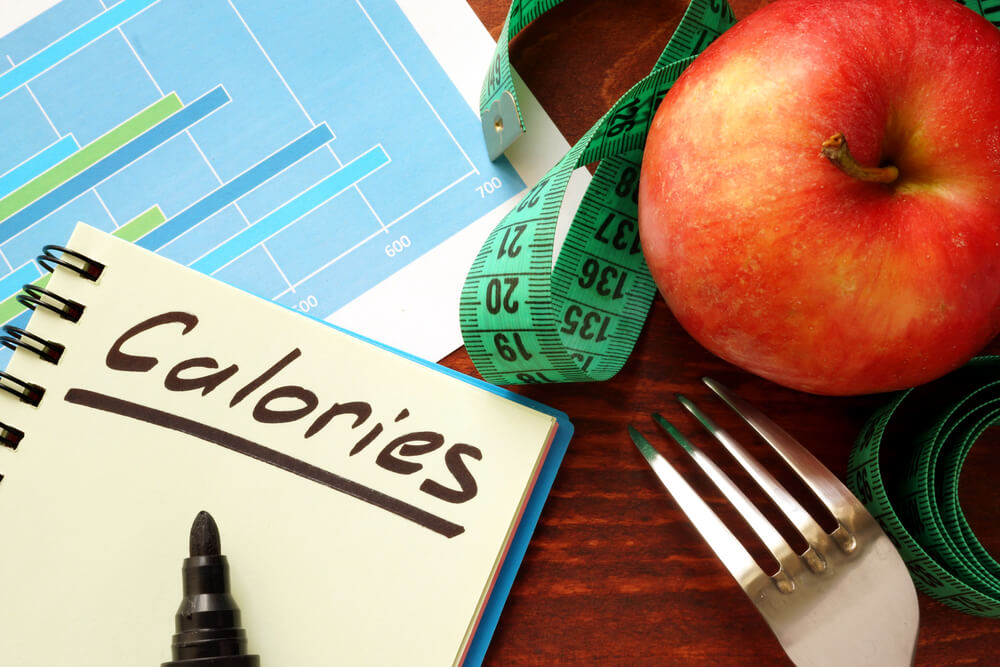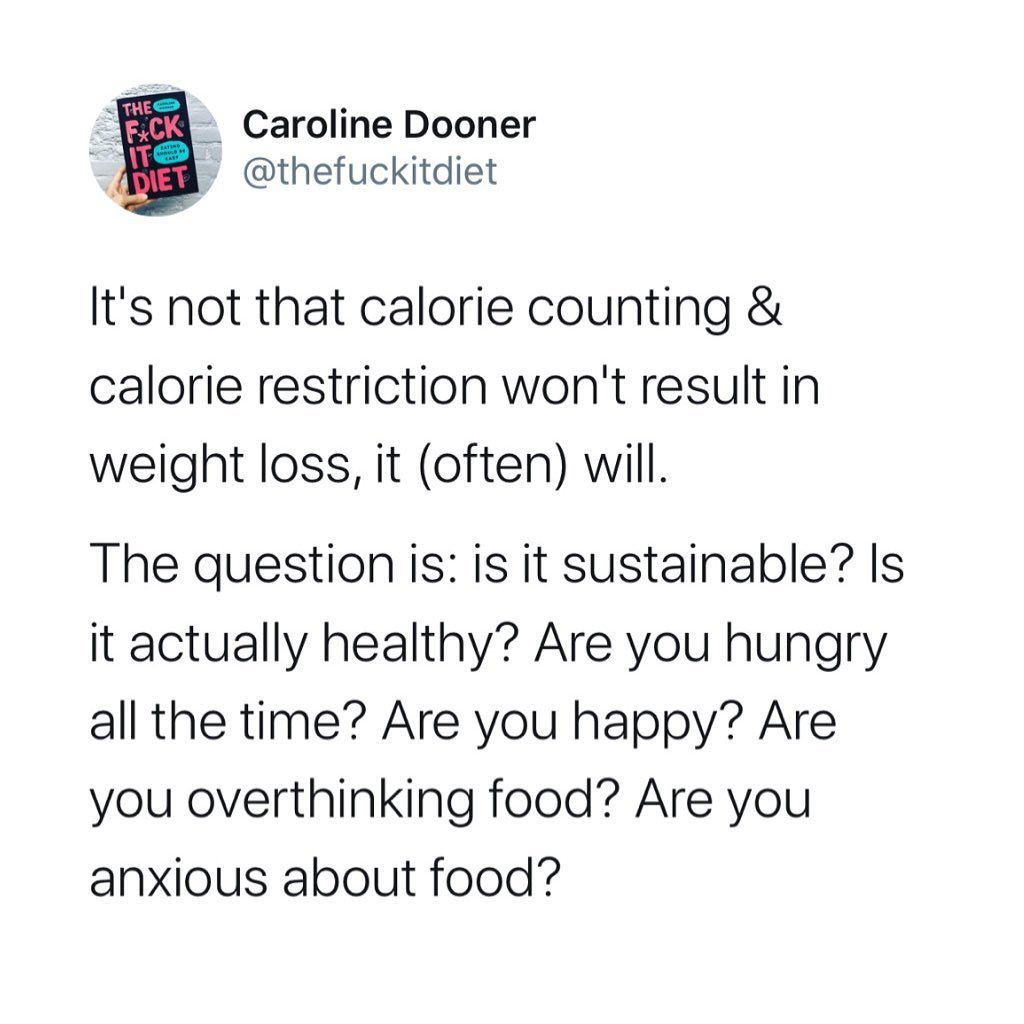
Should I Count Calories?
Many of us wonder if we should count calories to lose weight — and everyone from Harvard University to the U.S. government seems to say ‘yes.’ But as Caroline Dooner, author of The F*ck It Diet, puts it, “It’s not that calorie counting & calorie restriction won’t result in weight loss, it (often) will. The question is: is it sustainable?”

Source: Caroline Dooner on Instagram
The problem is that weight loss is only one side of calorie counting. Counting calories often goes hand-in-hand with restricting our energy intake, or being “on a diet” — and while dieting may help you lose weight at first, 83 percent of people gain back the weight they initially lost and more within two years after going on a diet.
So, why doesn’t counting calories work as well as doctors and government officials suggest? As Dooner writes, calorie counting and restriction do not work because they are not sustainable. Most of us cannot sustain the levels of calorie deprivation required to maintain dramatic weight loss — and those of us who do might be suffering from disordered eating.
There is no shortage of apps, quick tips, and health professionals willing to help you track and cut back on calories to lose weight. But here is why you should tune out the noise of diet culture, and why you’re better off practicing intuitive eating instead of counting calories.
Why Counting Calories Won’t Lead to Long-Term Weight Loss
As a society, we often correlate the ability to lose weight and keep it off with greater “willpower” or greater virtue. Counting and restricting calories, and staying skinny, seems to indicate a certain strength of character that eating a normal diet or being fat does not.
In reality, however, most of us cannot sustain long-term weight loss, even with caloric restriction, due to the fundamental changes it enacts on our biology. As a result, undertaking a diet often wreaks havoc on our self-esteem. We think we are too “weak” to stick to calorie counting and restriction when in reality, it goes against our very nature to stay on a diet long-term.
Because dieting and caloric restriction force our bodies into an unnatural state, our biology changes to adapt to the new environment created by the lower energy intake it receives when on a diet. These changes often mean that we quickly gain back the weight we lost in the initial stages of a diet. Frequently, we even weigh more after a diet than we did before the diet.
Many physical and psychological factors contribute to the transitory nature of weight loss. Once you understand these factors, it becomes readily apparent why counting and restricting calories is not a long-term solution for weight loss. Here is what fad diets won’t tell you when they tell you to count calories, including the dangerous effects of calorie deprivation.
People who count calories think about food more often.
A classic study conducted in 1950 found that preoccupation with food is one of the most pronounced responses to calorie deprivation. In other words, if you count and restrict your calorie intake, you will spend more time obsessing over what you eat than if you did not.
In addition to spending more time thinking about food, people who restrict their calorie intake are more sharply attuned to food-related stimuli. Research suggests that people who are calorie-deprived have stronger senses of smell and find that food tastes better than those who eat normally.
These instincts date back to our days as cavemen. Humans were hunter-gatherers, and the biological urge to seek food helped keep us alive.
It’s no wonder, then, that food becomes more difficult to resist as we become more deprived. “Caving in” by eating something tasty that doesn’t align with your diet doesn’t represent a lack of willpower so much as a psychological drive to find food at all costs, or else risk starvation.
Reducing your energy intake slows your metabolism.
Dieters tend to gain back more weight than they lost. That might sound strange — until you consider the effects of short-term calorie deprivation on our long-term metabolic health.
During periods of caloric restriction, the body reduces its energy expenditure, the number of calories it requires in order to function. This occurs for two reasons:
Firstly, when calorie deprivation results in successful weight loss, the smaller body requires fewer calories to operate.
Secondly, our metabolism becomes more efficient when we restrict our caloric intake. The body adapts to receiving fewer calories through food by slowing the rate at which it burns them.
These changes to our metabolic rate persist long after we stop dieting. This is why you can do everything “right,” following all the “rules” of your diet, only to find that you have gained, rather than continued to lose, weight.
Discouraged by the lack of continued progress, people may then decide to give up on their diets altogether. Or, they may simply find that they gain back the weight, despite maintaining lower caloric intake, due to the slowed rate of their metabolism.
Either way, most people are unable to keep off the weight they have lost due to calorie counting and restriction thanks to lasting changes in their metabolic rate. Case in point: even at a six-year follow-up, contestants on the reality TV show The Biggest Loser still maintained slower metabolisms than they had before competing on the show.
People who restrict their food intake experience more hunger.
Ever notice that you are constantly hungry when you’re on a diet? In addition to obsessively thinking about food and experiencing a slowed metabolism, studies show that people who count calories also feel hungrier than those who do not restrict their caloric intake.
Again, this is due to the way in which the body adapts to the internal conditions created by calorie deprivation. In response to calorie deprivation, writes researcher Tracy Mann, levels of our satiety and hunger hormones change. Levels of the satiety hormone, leptin, lower, while levels of the hunger hormone, ghrelin, increase.
As a result, people who restrict their calorie intake feel hungrier than those who do not. These feelings of hunger can persist even after eating a normal-sized meal, leaving dieters befuddled by their body’s betrayal.
Like our tendency to think about food more when we are calorie-deprived, our increased feelings of hunger are evolutionary in origin. The hungrier we feel, the greater our urge to seek food — so, by increasing our feelings of hunger, the body encourages human hunter-gatherers to venture in search of sustenance, giving the body the missing calories it requires to survive.
Why We Still Diet (Even Though It Doesn’t Work)
Evidence that caloric restriction does not work in the long-term dates back as early as WWII. So, why do we continue to diet, even though studies show that they do not work?
The short answer is that dieting is intricately woven into our culture. As Western media is increasingly introduced into other cultures (especially those that have not traditionally valued thinness as an ideal standard of beauty), research shows that body dissatisfaction and rates of dieting, eating disorders, and cosmetic surgery increase.
Our society produces media that reflects its values — and America increasingly places value on thinness as a requirement for beauty. As a result, we continue to buy into a multi-billion dollar diet industry and perpetuate myths about the relationship between weight and health.
Below, we explore in greater detail some of the reasons why calorie counting and calorie restriction continue to remain popular in the United States, despite a growing body of evidence that they are not a sustainable solution for long-term weight loss.
Our society equates thinness with moral value.
The government-led “war on obesity” has led to increased public attention not only on what and how much we eat, but also what we and others look like. As anti-obesity campaigns continually conflate fatness with laziness and a lack of willpower, we subconsciously absorb the idea that “thinner is better.”
This confusion of body size with moral value has negative effects on everybody — not just thin people or just fat people. However, evidence shows that this so-called “weight-centered health paradigm” (WCHP) increasingly leads to the stigmatization of fat people.
People living in larger bodies are disproportionately affected by diet culture and the “war on obesity.” As we are increasingly exposed to messaging that pathologizes obesity, we as a society become less accepting and more judgmental of fat people.
We learn to equate the health status and character of fat people with their weight and make recommendations for weight loss to strangers despite knowing nothing about their health history. If fat people cannot lose weight, we write them off as lazy or lacking in willpower. We bully and condescend to people online, coming from a place of inherent moral superiority that we’ve been taught to associate with our thin privilege.
Dieting is a multi-billion dollar industry.
As of 2017, the U.S. weight loss market was worth $66 billion. If we discovered a one-size-fits-all diet that actually worked, that multi-billion dollar industry would disappear overnight — and there is no lack of business magnates investing their wealth into the diet industry to ensure that doesn’t happen.
The fact of the matter is that the diet industry knows the products, methods, and services they sell do not work, and they simply do not care. Because dieters inevitably regain the weight they lose on any given fad diet, they are always in the market for the next big innovation in weight loss. Selling unsustainable diet plans, often with unrealistic advertising, ensures that dieters become repeat customers of an industry that’s been rigged against them from the start.
Many of us already know this. We’ve reallocated how we spend our dollars and unidentified ourselves as “dieters,” yet the diet industry continues to benefit from our hard-earned money. How, you ask? As the modern customer becomes increasingly disillusioned with the diet industry, the industry has changed its messaging to reflect the decreased popularity of “dieting.”
Now, the same old companies like Atkins and Weight Watchers (now rebranded as “WW” to drop the association with weight loss) are simply removing the word “diet” from their products and replacing it with “health” or “wellness.” The same old rich people are benefitting, and they are using the same old strategies to make us feel inadequate and dissatisfied with our bodies — only now, they are doing it in disguise.
Doctors misunderstand the relationship between weight and health.
As activist Marilyn Wann wrote, “The only thing anyone can diagnose by looking at a fat person is their own level of prejudice towards fat people.” Unfortunately, weight stigmatization is just as much of an epidemic in healthcare as it is in society as a whole.
Starting in medical school, doctors are taught to prescribe weight loss to fat people as a means of improving their overall health. The obsession with weight loss in healthcare results from the flawed body-mass index (BMI) system, which most doctors wrongfully use as a measure of a person’s health status.
The BMI system is a flawed indicator of overall health for many reasons:
Firstly, the BMI was created for statistical purposes, not for use in a clinical setting. The author of the original BMI study acknowledged this and warned against using the BMI to categorize individual patients.
Secondly, the BMI was based on studies of white men and does not account for differences in race, ethnicity, gender, or socioeconomic status.
Finally, the BMI does not distinguish between fat tissue, water weight, bone density, or even muscle weight. Muscle, in particular, weighs much more than fat. As a result, very muscular athletes are often categorized as “obese,” despite the fact that they are in excellent shape.
Studies show a strong correlation between obesity, heart disease, diabetes, and other health problems. Unfortunately, in the case of obesity, correlation has been confused with causation. These relationships could be due to an extraneous factor that has nothing to do with weight, but instead, we have used flawed evidence to launch a public health war against fatness.
As a result, doctors believe that reducing a patient’s body weight will ultimately reduce their risk of heart disease, type II diabetes, and other health conditions. Many healthcare professionals also learn that thinness is a prerequisite for being diagnosed with an eating disorder. As a result, disordered eating behaviors may be missed or even praised in fat patients, when they would be pathologized in thin ones.
The Best Alternative to Counting Calories
Clearly, calorie counting and restriction is not a sustainable method of weight loss — nor is weight a foolproof indicator of health. So, how do you know if your body is at the right weight for you, and what is the best way of eating to help you get there?
Set point theory states that our bodies are happiest within a certain weight range. This range, or “set point,” is hardwired into our DNA, making the “ideal weight” different for everyone (despite what the BMI scale suggests). Additionally, our bodies will fight to stay within this range, which is why — even when calorie counting and restricting — it can be so difficult to lose weight and keep it off.
The best way to maintain our ideal set point weight is to follow our body’s intuition. When we eat according to our body’s innate hunger and fullness cues, rather than trying to override them with calorie counting and restriction, we will take in the right amount of food to maintain our body’s unique set point weight.
This style of eating is known as intuitive eating. It’s important to note that intuitive eating is not a weight-loss strategy, but rather, a strategy for maintaining both mental and physical health. For some people, this style of eating may result in weight loss or weight gain; for others, it may mean they maintain their current weight.
There are ten principles that comprise the intuitive eating style, as defined by founders Evelyn Tribole and Elyse Resch in 1995:
- Reject the diet mentality.
- Honor your hunger, a.k.a. eat when you’re hungry.
- Make peace with food.
- Challenge food rules and labels like “good” or “bad.”
- Rediscover the satisfaction in eating.
- Feel your hunger and fullness.
- Cope with your emotions with kindness.
- Respect your body.
- Movement, rather than militant exercise.
- Honor your health with gentle nutrition, rather than rigid rules.
Getting started with intuitive eating — especially when you’ve been trying to lose weight through calorie counting and restriction for years — can feel challenging. If you are overwhelmed by the idea of intuitive eating but ready to stop being ruled by calories, get in touch with The Meadowglade. Our counselors would be happy to support you through your journey toward a more intuitive style of eating.
